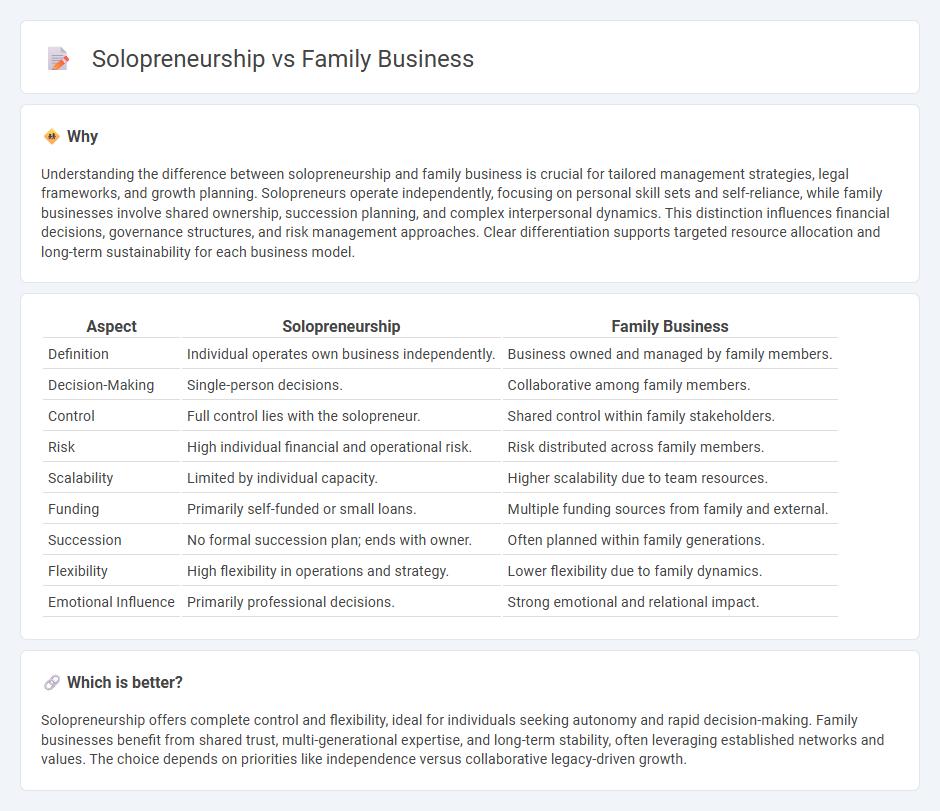
Solopreneurship involves a single individual managing all aspects of a business, offering complete control and agility in decision-making. Family businesses, on the other hand, are multi-generational ventures where ownership, management, and succession planning often involve complex dynamics and shared responsibilities. Explore the key differences in structure, challenges, and growth opportunities between solopreneurs and family-owned enterprises.
Why it is important
Understanding the difference between solopreneurship and family business is crucial for tailored management strategies, legal frameworks, and growth planning. Solopreneurs operate independently, focusing on personal skill sets and self-reliance, while family businesses involve shared ownership, succession planning, and complex interpersonal dynamics. This distinction influences financial decisions, governance structures, and risk management approaches. Clear differentiation supports targeted resource allocation and long-term sustainability for each business model.
Comparison Table
| Aspect | Solopreneurship | Family Business |
|---|---|---|
| Definition | Individual operates own business independently. | Business owned and managed by family members. |
| Decision-Making | Single-person decisions. | Collaborative among family members. |
| Control | Full control lies with the solopreneur. | Shared control within family stakeholders. |
| Risk | High individual financial and operational risk. | Risk distributed across family members. |
| Scalability | Limited by individual capacity. | Higher scalability due to team resources. |
| Funding | Primarily self-funded or small loans. | Multiple funding sources from family and external. |
| Succession | No formal succession plan; ends with owner. | Often planned within family generations. |
| Flexibility | High flexibility in operations and strategy. | Lower flexibility due to family dynamics. |
| Emotional Influence | Primarily professional decisions. | Strong emotional and relational impact. |
Which is better?
Solopreneurship offers complete control and flexibility, ideal for individuals seeking autonomy and rapid decision-making. Family businesses benefit from shared trust, multi-generational expertise, and long-term stability, often leveraging established networks and values. The choice depends on priorities like independence versus collaborative legacy-driven growth.
Connection
Solopreneurship and family business intersect through the shared emphasis on personalized management and strong relational dynamics, where solopreneurs often rely on family support to scale operations. Family businesses benefit from solopreneurial agility, enabling rapid decision-making and innovation within established trust frameworks. Both models prioritize long-term sustainability and value-driven growth rooted in personal commitment and legacy.
Key Terms
Succession Planning
Succession planning in family businesses involves preparing the next generation to take over leadership roles and ensuring continuity, often through structured mentorship and formal training programs. Solopreneurs face unique challenges in succession as their businesses are typically highly personalized, requiring careful documentation and automation to enable smooth transfer or sale. Explore detailed strategies for effective succession planning tailored to both family businesses and solopreneurs.
Autonomy
Family businesses often balance autonomy with collaborative decision-making among members, leveraging shared values and long-term goals to drive success. Solopreneurs enjoy complete control over their business operations, enabling swift adaptations and personalized strategies without the need for consensus. Discover more about the unique autonomy dynamics in family businesses and solopreneurship to optimize your entrepreneurial journey.
Governance
Family business governance involves structured decision-making processes, clear roles, and conflict resolution mechanisms to balance family dynamics with business goals. Solopreneurship governance centers on individual accountability and agile decision-making without formal hierarchies, allowing swift adaptations to market changes. Explore detailed strategies and tools for effective governance in both models to enhance your business performance.
Source and External Links
Family Business - A family business is a commercial organization where management decisions are influenced by multiple generations of a family, commonly found across various sized businesses globally.
Family Business Beer Company - A family-owned brewery in Dripping Springs, Texas, known for its award-winning beers and expanding distribution throughout the state.
The Family Business - An American crime family drama series created by Carl Weber, focusing on the Duncans who run an exotic car dealership with a secret life.
 dowidth.com
dowidth.com